 W
WThe economy of Israel is a developed free-market economy. Israel ranks 35th on the World Bank's ease of doing business index. It has the second-largest number of startup companies in the world after the United States, and the third-largest number of NASDAQ-listed companies after the U.S. and China. American companies such as Intel, Microsoft, and Apple built their first overseas research and development facilities in Israel. Other high-tech multi-national corporations, such as IBM, Google, Hewlett-Packard, Cisco Systems, Facebook and Motorola have opened R&D centers in the country.
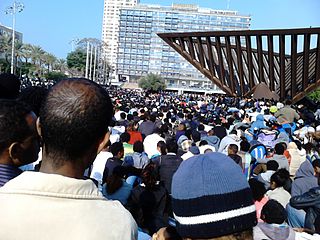 W
WAfrican immigration to Israel is the international movement to Israel from Africa of people that are not natives or do not possess Israeli citizenship in order to settle or reside there. This phenomenon began in the second half of the 2000s, when a large number of people from Africa entered Israel, mainly through the then-lightly fenced border between Israel and Egypt in the Sinai Peninsula. According to the data of the Israeli Interior Ministry, 26,635 people arrived illegally in this way by July 2010, and over 55,000 by January 2012. In an attempt to curb the influx, Israel constructed the Egypt–Israel barrier. Since its completion in December 2013, the barrier has almost completely stopped the immigration of Africans into Israel across the Sinai border.
 W
WThe Bank of Israel is the central bank of Israel. The bank's headquarters is located in Kiryat HaMemshala in Jerusalem with a branch office in Tel Aviv. The current governor is Amir Yaron.
 W
WBanking in Israel has its roots in the Zionist movement at the beginning of the 20th century prior to the establishment of the State of Israel in 1948.
 W
WThe Dead Sea Works is an Israeli potash plant in Sdom, on the Dead Sea coast of Israel.
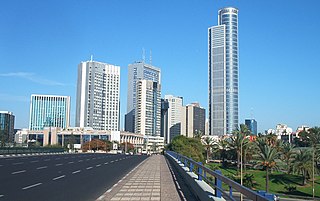 W
WThe Diamond industry of Israel is an important world player in producing cut diamonds for wholesale. In 2010, Israel became the chair of the Kimberley Process Certification Scheme. As of 2016, cut diamonds constituted 23.2% of Israel's total exports and they were the country's biggest export product, amounting to 12% of the world's production.
 W
WThe Diamond Tower is a skyscraper located in the Tel Aviv District city of Ramat Gan, Israel, containing the world's largest diamond trading hall, accommodating up to 1,000 people. At 115 meters and 32 floors, the tower was the tallest building in Ramat Gan from its completion until 2000, when it was surpassed by the Sheraton City Tower. It was also the tallest building in Israel outside of Tel Aviv upon its completion in 1992. Designed by Eli Gvirtzman, the tower serves as the 'head-tower' of the Israel Diamond Exchange with the first twenty floors serving only diamantaires.
 W
WFishing in Israel is a branch of the Israeli economy with historical significance. The three main natural fishing zones are the Mediterranean Sea, the Gulf of Aqaba, and the Kinneret. A fourth area that was once historically significant, Lake Hula, no longer exists, as it was drained in the 1950s. In addition, aquaculture the growth of fish in ponds or in cages, is rising in prominence.
 W
WThe Manufacturers Association of Israel (MAI) is the representative body of all industrial sectors in Israel: private, public, kibbutz and government industries. The MAI has a membership of over 2,000 organizations and industrial plants, which are responsible for more than 95% of the industrial production in Israel.
 W
WMercantile Discount Bank is a major commercial bank in Israel, and is a subsidiary of Israel Discount Bank.
 W
WThe Economic Strategy Ministry was a ministry in the Israeli cabinet.
 W
WThe Ministry of Economy is a ministry of the Israeli government that oversees commerce, industry and labor in Israel.
 W
WMishor Adumim is an industrial park located in the industrial zone of the Israeli settlement of Ma'ale Adumim, about 10 minutes' drive from Jerusalem, in the West Bank.
 W
WNatural gas in Israel is a primary energy source in Israel, mainly utilized for electricity production and to lesser degree in industry. Israel began producing natural gas from its own offshore gas fields in 2004. Between 2005 and 2012, Israel had imported gas from Egypt via the al-Arish-Ashkelon pipeline, which was terminated due to Egyptian Crisis of 2011-14. As of 2017, Israel produced over 9 billion cubic meters (bcm) of natural gas a year. Israel had 199 billion cubic meters of proven reserves of natural gas as of the start of 2016. In early 2017, Israel began exporting natural gas to the Kingdom of Jordan.
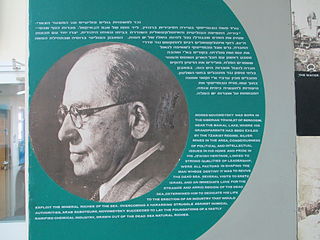 W
WMoshe Novomeysky was an Israeli engineer and businessman. He was an early developer of the Palestine Potash Company, precursor of the Dead Sea Works.
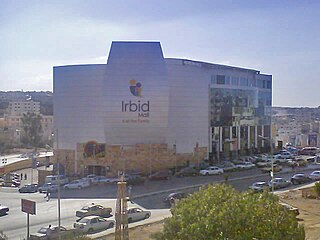 W
WQualifying Industrial Zones (QIZ) are industrial parks that house manufacturing operations in Jordan and Egypt. The QIZ program was introduced in 1996 by the U.S. Congress to stimulate regional economic cooperation. Goods produced in QIZ-designated areas in Egypt, Jordan and the Palestinian territories can directly access U.S. markets without tariff or quota restrictions, subject to certain conditions. To qualify, goods produced in these zones must contain a small portion of Israeli input. In addition, a minimum 35% value to the goods must be added to the finished product. The idea was first proposed by Jordanian businessman Omar Salah in 1994.
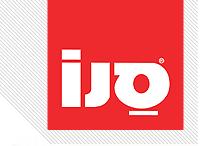 W
WSano is a detergent products manufacturer in Israel founded in 1961 by Bruno Landesberg. The company produces toiletries and hygiene products, disposable diapers, incontinence products for adults, household cleaning products, laundry detergents, pesticides and insect repellents, cosmetics and various paper products. Sano is headquartered in Hod Hasharon with subsidiary plants in Netanya, Kibbutz Snir, Emek Hefer and Eastern Europe.
 W
WSha'ar Binyamin is a light industrial park established in 1998 as a trade and services area in the Mateh Binyamin Regional Council, Israeli-occupied West Bank. It is located 2km north of Geva Binyamin on Route 60 and about 5 minutes drive from Pisgat Ze'ev in Jerusalem. The park covers an area of 606 dunams.
 W
WSilicon Wadi is an area with a high concentration of high-technology companies on the coastal plain of Israel, similar to Silicon Valley in the U.S. state of California, and is the reason Israel is nicknamed the Start-Up Nation. The area covers much of the country, although especially high concentrations of high-tech industry can be found in the area around Tel Aviv, including small clusters around the cities of Ra'anana, Petah Tikva, Herzliya, Netanya, the academic city of Rehovot and its neighbour Ness Ziona. In addition, high-tech clusters can be found in Haifa and Caesarea. More recent high-tech establishments have been raised in Jerusalem, Beersheba, and in towns such as Yokneam Illit and Israel's first "private city," Airport City, near Tel Aviv.
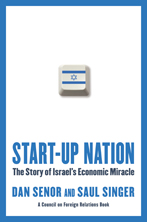 W
WStart-up Nation: The Story of Israel's Economic Miracle is a 2009 book by Dan Senor and Saul Singer about the economy of Israel. It examines how Israel, a 60-year-old nation with a population of 7.1 million, was able to reach such economic growth that "at the start of 2009, some 63 Israeli companies were listed on the NASDAQ, more than those of any other foreign country."
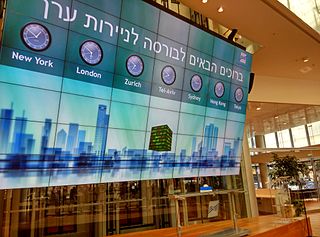 W
WTA-35 Index is an Israeli stock market index computed by the Tel Aviv Stock Exchange that lists the largest 35 companies in the TA-125 Index.
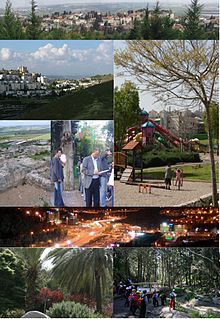 W
WYokneam Illit, also Yoqne'am Illit and Jokneam Illit, is a city in northern Israel. It is located in a hilly region of the lower Galilee at the base of the Carmel Mountains, and overlooks the Jezreel Valley. It is 21 kilometres from Haifa and 80 kilometres (50 mi) from Tel Aviv. Yokneam is known as Israel's "Startup Village," because its high-tech hub is surrounded by forest and small communities.